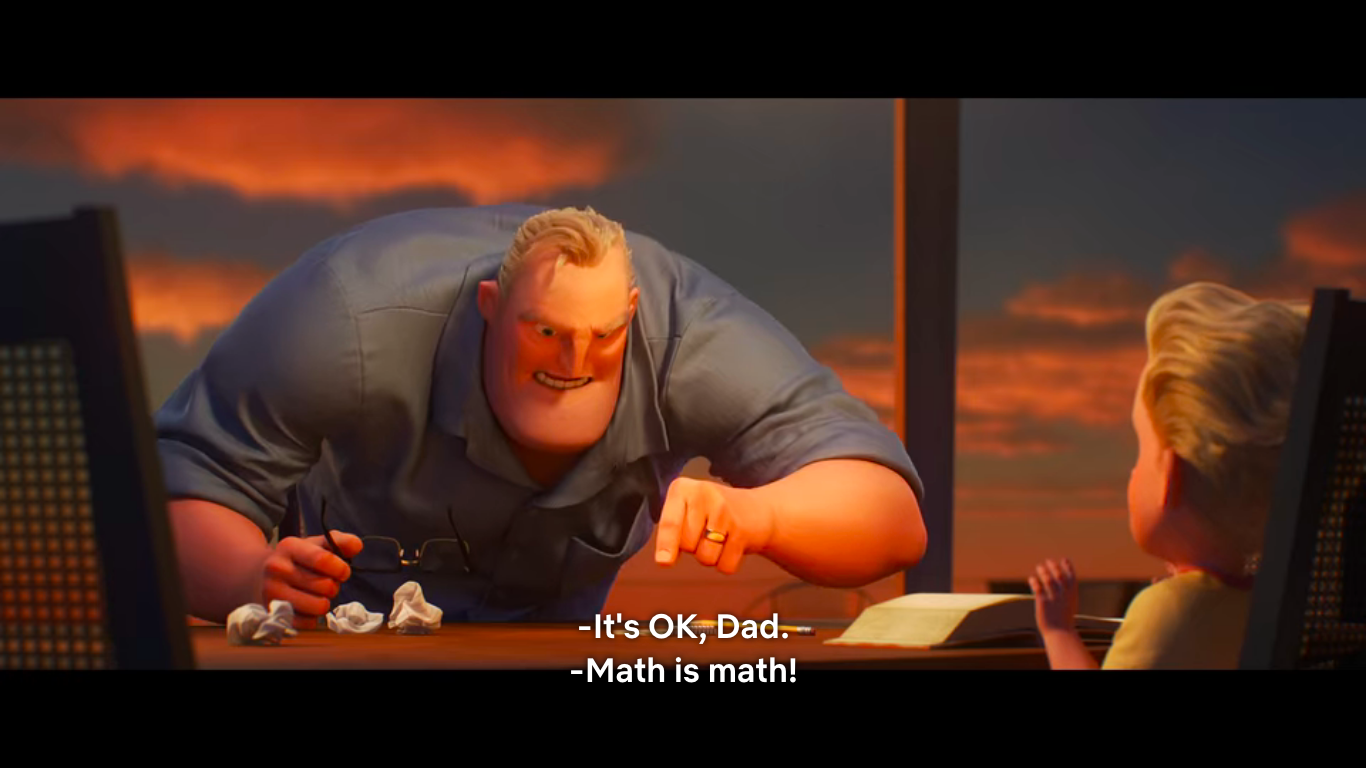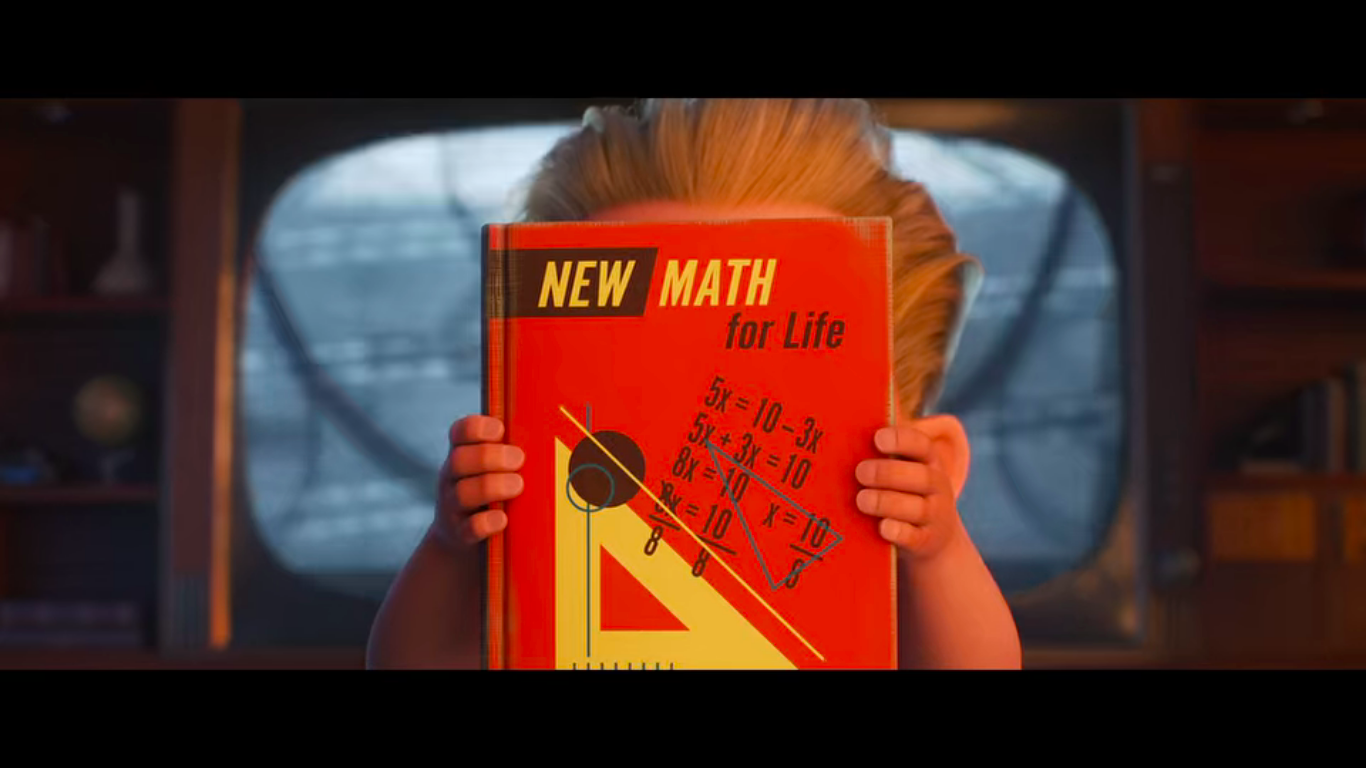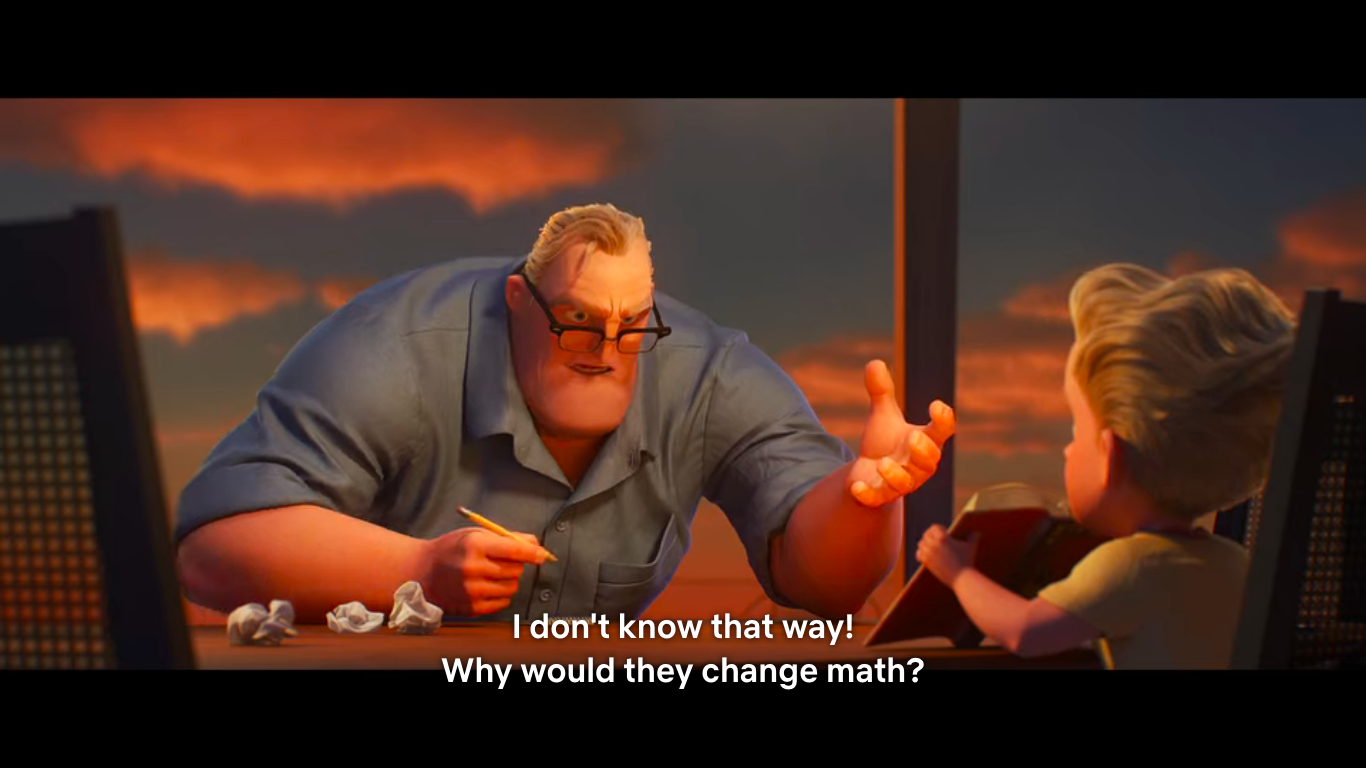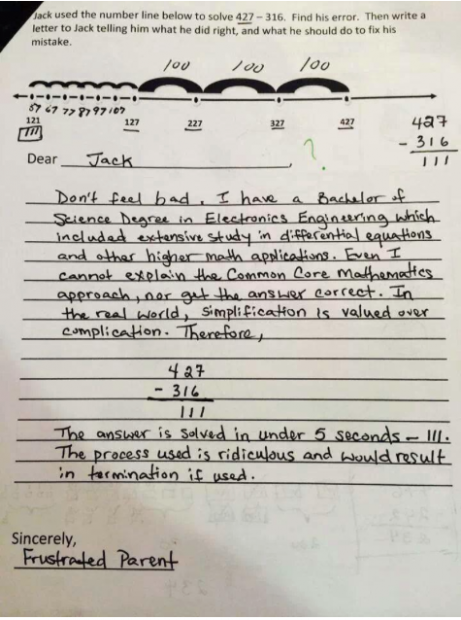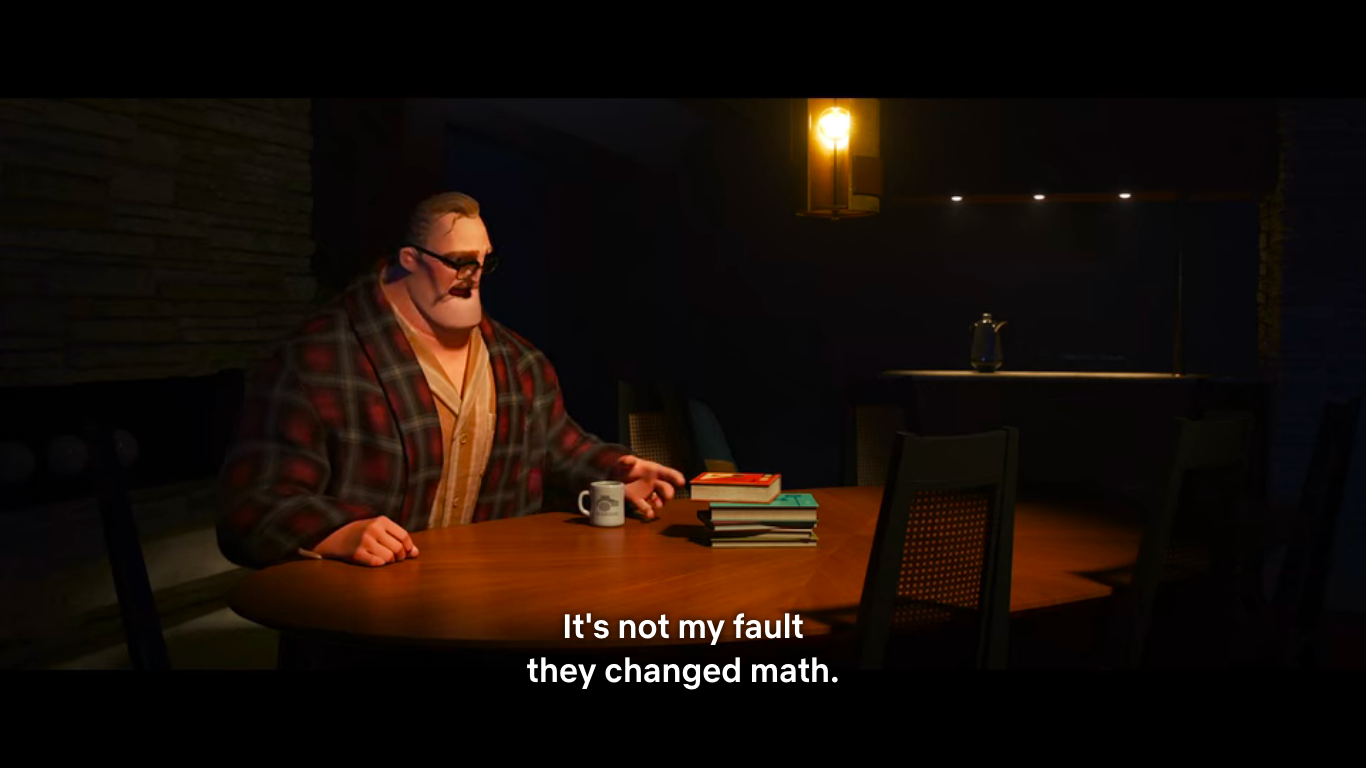Mythbusting Mr. Incredible's "New Math"
"Why would they change math?! Math is math! MATH is MATH!!" Bob Parr (aka Mr. Incredible) protested in Incredibles 2.
Most people who enjoyed Incredibles 2 (coming to Disney+ on July 31st, 2020) will likely laugh at this joke. The joke works because so many parents today are struggling with the changes brought about by Common Core math. But is Common Core deserving of all of the jokes at its expense?
Although I sympathize with parents' difficulties with helping their students with these "new" math problems, as a PhD student studying math education and math teacher education, I also want to share my knowledge about why Common Core math is a change for the better and also not much of a change at all.
Math Education Reform in the 1960s
The Incredibles and Incredibles 2 are set in the early 1960s, a time in which a different math reform called "New Math" was underway.
New Math was a movement spurred by the launch of Sputnik and the United States feeling like they were falling behind the Soviet Union in a global competition for success and innovation (which had few tangible measures). The curriculum for new math wanted to enhance students' conceptual understanding of math - knowing why standard algorithms work - rather than just procedural understanding - knowing how to do a standard algorithm.
Much like what we refer to as "inquiry learning" today, New Math wanted students to try and solve problems before being given the so-called rules, or standard algorithm (this practice is very common in math classes in countries like Japan whose students consistently earn higher scores than American students on international exams).
Advocates of New Math argued for less repetitive drilling and instead for math that looked more like what mathematicians did - finding patterns and engaging with ideas like set theory and number theory.
Even in this era, parents and teachers bemoaned the new content and strategies for teaching the content that involved more hands-on learning with objects rather than pen and paper arithmetic that they were used to.
Although New Math was effective in shifting the amount of time spent on arithmetic towards incorporating more advanced topics like geometry and calculus, teachers did not receive enough support in the mathematical content to achieve the goals of the movement in their classrooms besides using logic games.
After the end of the New Math movement, the goals of school math continued to swing back and forth between conceptual and procedural understanding, coming to a head in the so-called "math wars" of the 1990s, partly instigated by the 1983 Nation at Risk report which again highlighted how the United States was falling behind the rest of the world.
Over the course of the decades between New Math and today, research in math education and the psychology of how we learn have made leaps and bounds and have been trying to impact what math looks like in schools.
Common Core in 2000s and 2010s
In the 2000s, the United States again felt like it was falling behind in several global economic indicators relative to countries like China, Japan, and South Korea as well as education leaders like Finland and Canada.
The Common Core State Standards were seen as one important step towards preparing our students for the jobs of the future by again foregrounding conceptual understanding.
Unfortunately, there are several myths about what the Common Core is and is not. I want to help dispel some of these so that parents and students alike can see how Common Core has not changed math in a negative way.
Myth 1: Common Core is a national curriculum.
This is false! First, the Common Core is not a curriculum.
The Common Core is a set of descriptions of what students are expected to be able to do in each year of school. They do not specify exactly what the content should be to help students master the set of skills nor do they specify exactly how teachers should teach it.
To put in terms that the super-speedy Dash Parr would understand, the Common Core is determining where the finish line of the race is - not telling racers how they have to run, what equipment they have to wear, or whether or not they can use their superpowers.
Secondly, the Common Core is not federally mandated.
The Common Core was developed independently from the United States federal government by a bipartisan committee sponsored by a collection of governors and non-profit organizations.
Before the Common Core, states were extremely varied in the race they were expecting their students to run. The developers were just trying to make sure the finish line was in the same spot for students in all 50 states so that a student who excelled at the 100-meter-dash wouldn't be expected to run a mile if they moved from one state to another.
Furthermore, before the common core, it was difficult to compare proficiency levels across states. Continuing the analogy, a student who ran a 20-minute mile might be classified as "super" on one state's assessment, but "not super" in another state because that state defined "super" as running a mile in less than 10 minutes.
After the standards were developed, states were able to choose whether they wanted to adopt these standards - and the standardized tests that accompany them - or not.
Currently, only 43 states are using Common Core standards; several states declined to adopt them or have declined to use the standards-aligned tests. Instead, they're developing their own standards and tests (that are often built on and look very similar to Common Core).
The national government under Obama did have an effect on how many states decided to adopt Common Core though because they sponsored a competition called Race to the Top for states and school districts to receive bonus federal funding.
To enter the competition and receive money, a district had to demonstrate how it was going to align with the Common Core standards, whether with curriculum or assessments. They had to provide some evidence that they were going to expect students to run the race with the finish line set by the Common Core.
Myth 2: Common Core is part of the Democrat agenda.
This is false also!
I will repeat that the Common Core was developed by a bipartisan committee and underwent revision from people on both sides of the political divide.
Several conservative organizations like the Fordham Institute (a research organization) and former Florida Governor Jeb Bush support the Common Core because they acknowledge the positive outcomes that are associated with raising our expectations of schools.
And several liberal figures and organizations like the National Education Association oppose the Common Core because they do not support standardized tests in general or are worried about the impact the change will have on teachers.
Although I am not sure where Mr. Incredible stands on the role of the federal government or liberal versus conservative ideals, I think more of his complaints about math reform would fall under the umbrella of the next myth.
Myth 3: Common Core makes math harder and more complicated.
Many of parents' complaints that can be found online or in everyday conversation are that the procedures encouraged by the Common Core math standards are extremely inefficient or ridiculous.
Frustrated parents think it is more important to get the correct answer to a problem efficiently than to show their work using these complicated procedures.
The main mistake is that Jack subtracted 306 (3 groups of 100 and 6 groups of 1) rather than 316 (another group of 10).
To these parents I want to say: although some of the procedures may involve strange steps or seem silly, having students solve problems in these ways or in multiple ways helps them achieve conceptual understanding, which is better for them in the long-run (Richland, Zur & Holyoak, 2007; Rittle-Johnson, Star, Durken & Loehr, 2018).
Common Core makes math different, not necessarily harder, and is supported by research in math education about how learning the reasons why the efficient algorithm works is better for retention and problem-solving.
With the new standards, students are expected to be able to explain and critique (two skills which are more highly valued in the workplace) different methods for solving problems rather than just memorizing one way.
But what about the fact that test scores have gone down since Common Core was implemented?
Yes, scores on yearly assessments have dropped in the first few years of implementing Common Core and this can be interpreted as evidence that Common Core makes math harder.
But the tests that have been developed to align with the Common Core standards are considered to be harder partly because they are unfamiliar and ask questions in different ways than the ways students are used to being tested and the way teachers are used to teaching.
This last piece about how teachers and their teaching has been affected by the Common Core is one of the main reasons that I am critical of the Common Core.
In many places, teachers have not been provided with enough support for successful implementation. Teachers have to master the very skills that they are expected to teach their students because their math education did not teach them in these ways.
Teachers also have to learn new ways of teaching because along with new skills come new misconceptions and mistakes that learners are likely to make. Teachers have spent a lot of time figuring out how to best instruct and help students with mistakes related to the standard algorithm.
Now, teachers need help with identifying and remedying the kinds of mistakes that students make when asked to solve problems that align with the Common Core.
But what about parents?
Unfortunately, this does not help parents much because they, like Mr. Incredible, still want to help their kids but aren't receiving the kind of training that teachers have access to.
Websites, guides and books have been popping up to offer parents assistance with Common Core.
But parents don't need to become experts in Common Core methods; sometimes it can just be better to ask kids about their thinking and discuss it with them. Making claims and defending them is one of the most important skills that the Common Core tests assess, regardless of age level or math content area.
Furthermore, try not to pass on math anxiety and instead foster a positive math environment by playing math games or showing your child how you use math confidently in your everyday life.
One of the most effective ways to help your kids with math is to promote a growth mindset - the idea that intelligence or success, especially in something like math, is not pre-determined but rather can be developed through effort and a positive attitude - by praising your child for not giving up and trying their best.
In my own tutoring of high school students, I find that just expressing enthusiasm for math and how cool I think it is when I realize a new aspect of how math is interconnected can go a long way.
The Future of Common Core
Social scientists in academia and in policy are doing a lot of research on how these new standards are changing the lives of students.
Some places are showing signs of success, like closing the achievement gap between more and less disadvantaged students.
Research is also being done on improving teachers' ability to teach Common Core, which doesn't mean having them just take more math classes, but rather understand the connections among math content areas like students are expected to do.
More work still needs to be done on how to effectively help parents become more capable and confident with Common Core.
One of the first steps towards helping students is acknowledging the historical precedent for Common Core math and embracing the new ways of solving not as infuriating challenges to adults' superpowers of patience but rather as incredible opportunities to learn together.
Additional Reading
Vox has a great explanation of the Common Core
NPR has a Common Core FAQ as well


